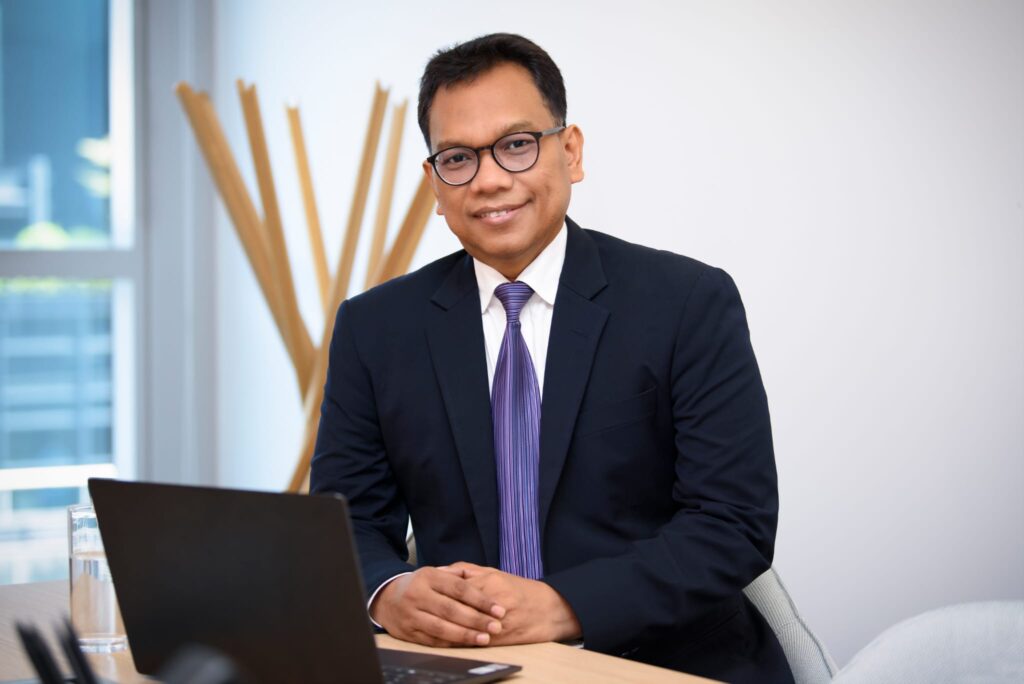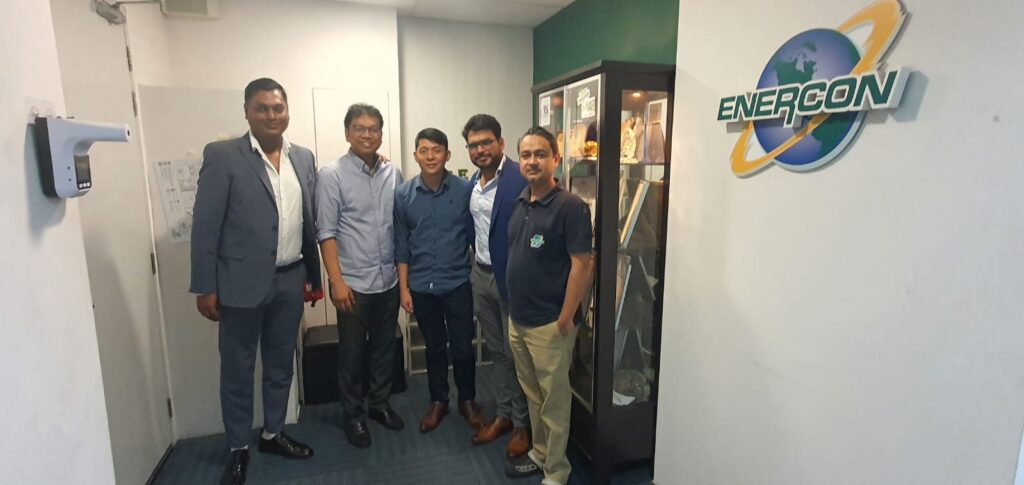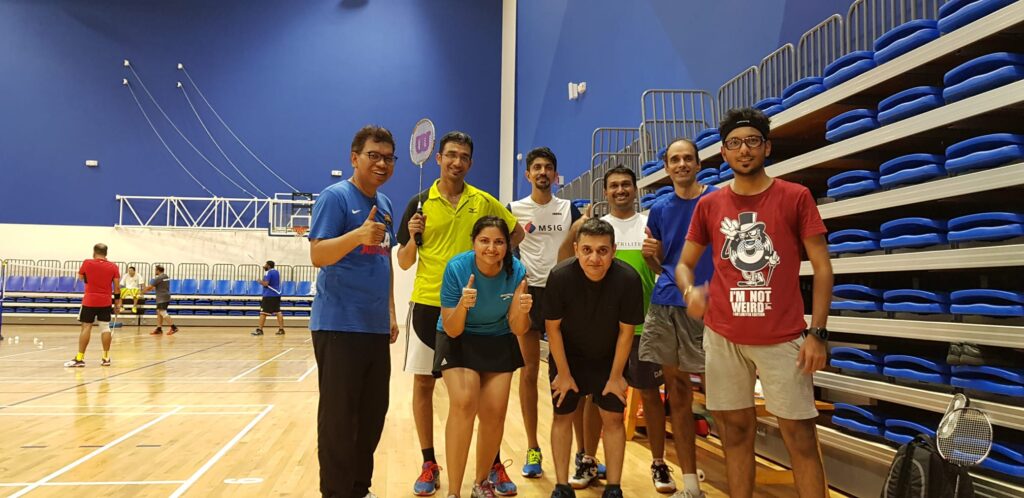Leading a Sustainable Future in the Energy Sector – SP Jain Global Alumni Spotlight with Azhar Othman (EMBA 2014)
Azhar Othman (EMBA 2014), the Executive Chairman of Enercon Asia, Group CEO of GENES, and Founder of the GAED Energy Advisory platform, brings a wealth of experience from the power generation, renewables, and smart energy industry. Azhar’s journey, a blend of personal and professional challenges and zeal, is underpinned by a deep-rooted commitment to family and supported by their unwavering love. Moreover, his career has been a testament to the positive transformation sweeping the energy sector, and his vision extends beyond profits, focusing on environmental stewardship.

Join us in delving into Azhar’s inspiring journey and the transformative impact he continues to make in the ever-evolving energy landscape.
Would you like to take us through your personal and professional journey so far?
So far, I would say my personal and professional aspects have been both challenging and exciting. On the personal front, I want to be able to take care of your family and ensure that they have a good roof over their head.
I consider myself fortunate to have the support of a loving family throughout my journey, both in my personal life and my business endeavours.
Professionally, I have been quite blessed as well to be surrounded by good people, good colleagues, senior members, and mentors to guide me and my company in the right direction. Given the ever-increasing global demand for energy, I believe we are on a promising trajectory to further expand and excel in this field.

Can you tell us about your experience and journey in the fields of power generation, renewables, and the smart energy industry? How has your background influenced your approach to innovation in these fields?
My journey in the fields of power generation, renewables, and the smart energy industry has been greatly influenced by our growing concerns about climate change. We’ve witnessed a very positive shift towards renewable and smart energy solutions, and it’s not limited to Singapore; many countries are actively seeking these innovations. This shift has created a conducive atmosphere for progress.
More significantly, our commitment to reducing carbon emissions has shaped our business approach. It’s not merely about profitability; it’s about doing good for the environment as well.
In terms of my background, my engineering degree has played an important role. It has provided a solid foundation and perspective that guides our company’s direction and fuels our innovation. When you have a deep understanding of your industry and come from a background well-versed in its intricacies, the ability to think innovatively and plan for the future becomes not necessarily easy, but certainly more accessible. The synergy between industry knowledge and innovation has been instrumental in our success.
How have COVID-19 and the Russia-Ukraine War impacted the energy market over the past few years?
The Russia-Ukraine War has had a significant impact on the energy market, notably by driving an increased demand for energy consumption. Before the war, the adoption rate for renewable energy, especially in Singapore, was rather slow. However, following the war, there has been a notable surge in interest and adoption of renewable energy solutions.
On the other hand, the COVID-19 pandemic has had a dual effect. First, it led to a surge in energy demand, driven by factors like the increased use of data centres and artificial intelligence. Second, it underscored the importance of having stable power supplies, governance, and overall national stability.
These combined factors have further intensified the demand for energy. It has become crucial to be well-prepared for potential future incidents while appreciating the growth and stability we’ve achieved after navigating through these challenges.
Artificial intelligence (AI) is revolutionising various industries. How do you envision AI impacting the energy sector, particularly in terms of improving efficiency, optimising operations, or enabling smarter decision-making?
I could not emphasise more on the importance of AI. Its impact will be felt across industries, and the energy sector is no exception.
The influence of AI will be overwhelmingly positive, ushering in improved energy analysis, enhanced consumption management, increased efficiency, streamlined operations, and cost-effective solutions to reduce losses. AI will become an integral part of our lives, and it’s crucial that we not only embrace it but also gain a thorough understanding of how it operates. Resisting this change will lead to falling behind. It’s important to note that AI isn’t about replacing humans but about humans understanding and effectively collaborating with AI. This is a pivotal factor that all industries must grasp, similar to the revolutions brought about by the internet and electric vehicles or the transition from old to new industries. We must learn, adapt, and wholeheartedly embrace these advancements.
The Internet of Things (IoT) has played a significant role in efficient energy management, and now, we have the emerging concept of the Internet of Energy (IoE). How are organisations currently leveraging IoE, and what potential does it hold for optimising energy use, lowering costs, and enhancing energy production efficiency in the future?
Having been deeply involved in the development of energy platforms that cover the analytics of markets and so on, I’ve witnessed the potential of IoE. I look into the improvement of energy, efficiency, and elimination of losses, reduction of carbon, and of course, the decentralisation of energy, whereby humans all over the world can access energy at the lowest cost possible. Although this transformation won’t happen overnight, it’s an inevitable part of our future. We’ve seen how quickly societies adopt low-cost solutions, similar to the widespread adoption of mobile phones. The era of widespread, cost-effective energy access is on the horizon.
As the smart energy sector continues to evolve, what are the latest trends gaining traction, such as autonomous energy systems, smart grid infrastructure, and an increased focus on renewable energy sources? Additionally, how can a strong emphasis on robust cybersecurity help safeguard utilities against threats as they become increasingly digitised?
It is very, very true. With the evolution of technology, autonomous energy systems, decentralised power systems, and smart infrastructure, the focus on energy will increase the pickup rate from many countries. However, with these innovations comes a heightened need for robust cybersecurity measures. The digitisation of utilities makes them susceptible to various threats, including cyberattacks that can disrupt power supplies or compromise data security.
Therefore, while we embrace technological progress, it’s essential to maintain a strong emphasis on cybersecurity to protect these critical systems from malicious intent. Striking a balance between technological advancement and safeguarding the well-being of society is paramount in our journey toward a smarter energy future. Overall, we also need to ensure having a clear intent for the good of the human race.
Could you share any examples of innovative initiatives or companies successfully integrating multiple technologies, such as renewable energy, energy efficiency, blockchain, and AI, to create sustainable and impactful solutions in the energy sector?
I think numerous companies are indeed bringing innovation in this space. However, the successful implementation of these solutions faces certain challenges. These challenges include the maturity of the energy market in terms of its readiness to embrace and integrate these innovations, the acceptance of these changes by various stakeholders, including those whose livelihoods may be impacted, and the government’s role in balancing these changes while ensuring job security and technological advancement. Implementing multiple solutions can be complex.
Nevertheless, as time progresses, people and industries will increasingly adapt to and adopt these transformative solutions. So, it’s crucial for companies to persist in their innovative efforts, for society to embrace these changes, and for governments to provide support and regulation conducive to sustainable progress.
As a successful innovator in the energy sector, what advice would you give to aspiring professionals interested in driving change and making a positive impact in the industry? Are there any resources or learning opportunities you would recommend for those looking to deepen their knowledge in these areas?
I would advise you to keep learning, networking, and looking for the right people to work with. Most importantly, seek the right collaborators and focus on leveraging your skills to address industry challenges. Do not compete or try to achieve a certain kind of stature or recognition, and the rest will follow.

Let your work and intentions lead the way, fame and acknowledgment will naturally follow. If you have the wrong intent and wrong direction, you will end in the wrong endpoint. Maintaining ethical and professional standards in your endeavours is vital. Even if your journey doesn’t lead to the exact destination you envisioned, the satisfaction of doing things the right way will always be a source of pride.
Related Posts
-
 In This World of Internationalisation, Will You Survive?
No Comments | Jul 27, 2011
In This World of Internationalisation, Will You Survive?
No Comments | Jul 27, 2011 -
 Key to great interviewing
No Comments | Aug 19, 2011
Key to great interviewing
No Comments | Aug 19, 2011 -
 The Perks of Having a Global Network
No Comments | Oct 30, 2014
The Perks of Having a Global Network
No Comments | Oct 30, 2014 -
 Breaking corporates shackles to start a wealth management boutique
No Comments | Feb 18, 2015
Breaking corporates shackles to start a wealth management boutique
No Comments | Feb 18, 2015
